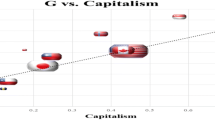Abstract
This chapter is intended to provide background for more focused work on entrepreneurial finance in emerging economies analyzed in depth in other chapters. We do so by covering the critical topic of economic growth and development in the context of institutional development with emphasis on the prevalence of corruption that seems endemic in transition and emerging economies. The chapter contains numerous references to those topics in China and Russia, as well as from other countries like India and Brazil. We focus on the informal institution of corruption and contrast it with the formal institutions of a society, noting that corruption flourishes in the context of institutional voids which in turn result from weak legitimate formal institutions. An important aspect of this chapter is a major section devoted to the current situation reflecting on the seeming development of deglobalization and the roles being played by China and Russia in that fluid context.
Access this chapter
Tax calculation will be finalised at checkout
Purchases are for personal use only
Similar content being viewed by others
References
Ang, Yuen Y. 2018. Autocracy with Chinese characteristics: Beijing’s behind-the-scenes reforms. Foreign Affairs 97: 39–46.
———. 2020. China’s gilded age: The paradox of economic boom & vast corruption. New York: Cambridge University Press.
Aslund, Anders. 2018. Russia’s economy: Macroeconomic stability but minimal growth. Russian Analytical Digest 220: 1–10.
Baldwin, Natylie, and Kermit E. Heartsong. 2014. Ukraine: Zbig’s grand chessboard and how the west was checkmated. Oakland: Tayen Lane.
Berger, Ron, Ram Herstein, Daniel J. McCarthy, and Sheila M. Puffer. 2019. Doing favors in the Arab world. International Journal of Emerging Markets 14 (5): 916–943.
Burnham, James. 1941. The managerial revolution: What is happening in the world. Westport: Greenwood Press.
Campbell, David F.J. 2019. Global quality of democracy as innovation enabler: Measuring democracy for success. New York: Palgrave Macmillan.
Gevorkian, Alexander V. 2018. Transition economies: Transformation, development, and society in Eastern Europe and the former Soviet Union. New York: Routledge.
Graham, Thomas. 2019. Let Russia be Russia: The case for a more pragmatic approach to Moscow. Foreign Affairs 98: 134–146.
Karhunen, Paivi, Riitta Kosonen, Daniel J. McCarthy, and Sheila M. Puffer. 2018. The darker side of social networks in transforming economies: Corrupt exchange in Chinese Guanxi and Russian blat/Svyazi. Management and Organization Review 142: 395–419.
Khanna, Tarun, and Krishna Palepu. 1997. Why focused strategies may be wrong for emerging economies. Harvard Business Review 15: 41–51.
Ledeneva, Alena, ed. 2018. The global encyclopedia of the informal economy. London: University College London Press.
Luzyanin, Sergey, and Zhao Huasheng. 2019. Russian-Chinese dialogue: The 2019 model. Moscow: Russian International Affairs Council, October 10. https://russiancouncil.ru/en/activity/publications/russian-chinese-dialogue-the-2019-model/
McCarthy, Daniel J., Sheila M. Puffer, and Daniel M. Satinsky. 2019. Does Russia have a role in the evolving global economy? Cross Cultural & Strategic Management 26: 265–289.
Nikitin, Andrei S. 2016. Investment rating as an instrument of effective govern management stimulation in Russian regions. Economic Policy. Russian Presidential Academy of National Economy and Public Administration 11: 192–221.
North, Douglass C. 1990. Institutions, institutional change and economic performance. Cambridge: Cambridge University Press.
North, Douglass C., John J. Wallis, and Barry R. Weingast. 2009. Violence and social order: A conceptual framework for interpreting recorded human history. Cambridge: Cambridge University Press.
North, Douglass C., John J. Wallis, Steven B. Webb, and Barry R. Weingast, eds. 2013. In the shadow of violence: Politics, economics, and the problem of development. Cambridge: Cambridge University Press.
Panibratov, Andrei. 2016. Home government influence on Russian MNEs: Balancing control against interest. International Journal of Emerging Markets 11: 474–496.
Peng, Mike W., Seung-Hyun Lee, and Denis Y.L. Wang. 2005. What determines the scope of a firm over time? A focus on institutional relatedness. Academy of Management Review 30: 622–633.
Powell, Walter W., and Paul J. DiMaggio. 1991. The new institutionalism in organizational analysis. Chicago: University of Chicago Press.
Puffer, Sheila M., and Daniel J. McCarthy. 2014. Institutional theory. In Wiley encyclopedia of management, ed. Cary L. Cooper, vol. 6, 3rd ed., 105–109. New York: Wiley.
Puffer, Sheila M., Daniel J. McCarthy, and Max Boisot. 2010. Entrepreneurship in Russia and China: The impact of formal institutional voids. Entrepreneurship: Theory and Practice 34: 441–467.
Puffer, Sheila M., Daniel J. McCarthy, and Alfred M. Jaeger. 2016. Institution building and institutional voids: Can Poland’s experience inform Russia and Brazil? International Journal of Emerging Markets 11: 18–41.
Scott, William R. 2005. Institutional theory: Contributing to a theoretical research program. In Great minds in management: The process of theory development, chapter 22, ed. Ken G. Smith, Michael A. Hitt, and Joe Foster, 460–484. Oxford: Oxford University Press.
———. 2008. Institutions and organizations: Ideas and interests. 3rd ed. Los Angeles: Sage.
Transparency International. 2019. Corruption perceptions index. www.transparency.org/cpi
Witt, Michael A. 2019. De-globalization: Theories, predictions, and opportunities for international business research. Journal of International Business Studies 50: 1053–1077.
World Bank. 2019a. World Bank world development indicators. http://datatopics.worldbank.org/world-development-indicators/
———. 2019b. Ease of doing business. https://data.worldbank.org/indicator/IC.BUS.EASE.XQ
Zheng, Yun. 2019. China’s new foreign investment law: Deeper reform and more trust are needed. Columbia FDI Perspectives: Perspectives on Topical Foreign Direct Investment Issues. No. 264, November 4. http://ccsi.columbia.edu/publications/columbia-fdi-perspectives/
Author information
Authors and Affiliations
Corresponding author
Editor information
Editors and Affiliations
Rights and permissions
Copyright information
© 2020 The Author(s)
About this chapter
Cite this chapter
Puffer, S.M., McCarthy, D.J. (2020). Economic Growth, Institutions, and Corruption in Emerging Economies. In: Klonowski, D. (eds) Entrepreneurial Finance in Emerging Markets. Palgrave Macmillan, Cham. https://doi.org/10.1007/978-3-030-46220-8_3
Download citation
DOI: https://doi.org/10.1007/978-3-030-46220-8_3
Published:
Publisher Name: Palgrave Macmillan, Cham
Print ISBN: 978-3-030-46219-2
Online ISBN: 978-3-030-46220-8
eBook Packages: HistoryHistory (R0)




